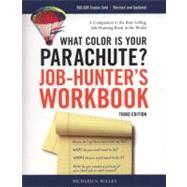Based on Bolles' acclaimed Flower exercise, this easy-to-use workbook focuses on translating personal interests into marketable job skills. This companion guide also explores often-ignored issues such as emotional and spiritual fulfillment in the workplace.
Career guru Richard N. Bolles has been helping job-hunters for forty years with his classic job-search guide, What Color Is Your Parachute? This revised and updated full-color textbook makes doing his highly effective Flower Exercise easy. With user-friendly exercises and plenty of space to write, the Job-Hunter’s Workbook will help you translate personal interests into marketable job skills.
Simple step-by-step worksheets will illuminate your favorite transferable skills, fields of special knowledge, job environments, values and goals, working conditions, and levels of responsibility and salary. Once you’ve completed this workbook, you'll have a comprehensive picture of your dream job, and be able to effectively target your ideal work situation.
Author Biography
Richard N. Bolles has led the career development field for more than 35 years. A member of Mensa and the Society for Human Resource Management, he has been the keynote speaker at hundreds of conferences. Bolles holds a bachelor’s degree cum laude in physics from Harvard University, a master’s degree from General Theological (Episcopal) Seminary in New York City, and three honorary doctorates.








